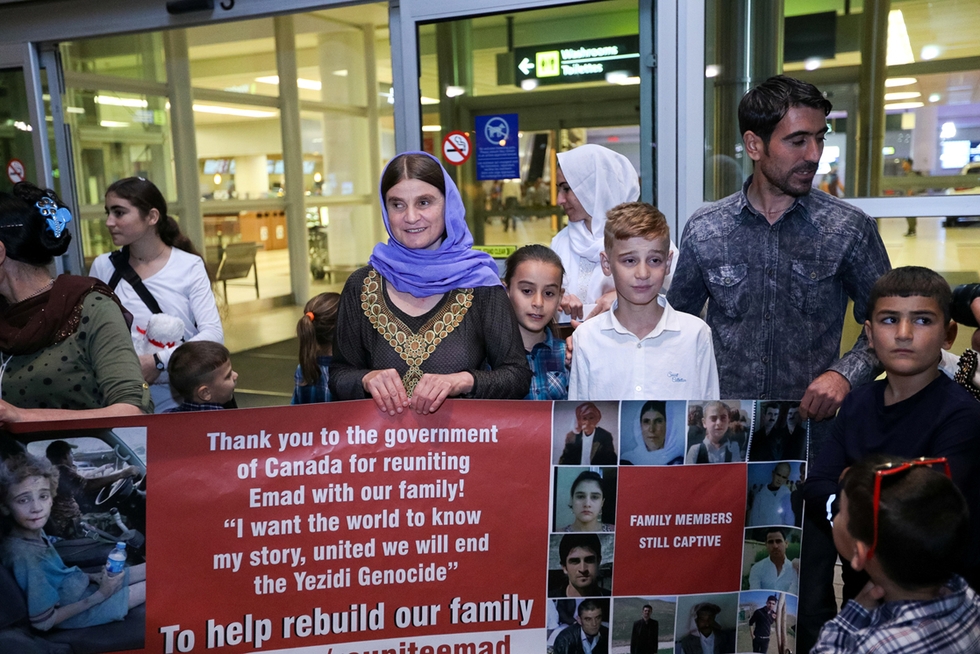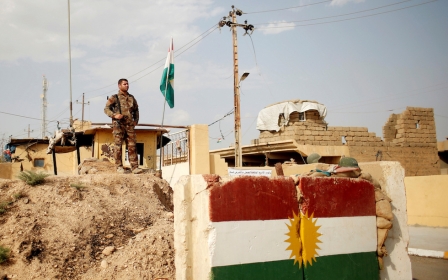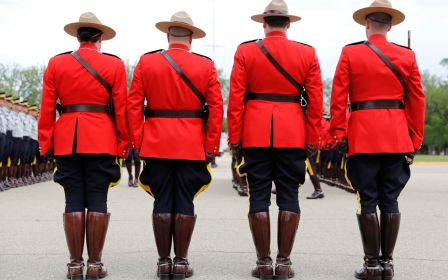Yazidis in Canada: Refugees find safety but face challenges

MONTREAL, Canada – For hundreds of Yazidis resettled across Canada in the past year, life outside their native Iraq has brought them something they had long desired but seemed to elude them: safety.
But despite their newfound security, Yazidis are trying to adjust to a new reality fraught with difficulties.
“It’s a struggle, of course,” said Dalal Abdi, a Yazidi-Canadian activist in London, Ontario - Canada’s most populous province - who works with newly-arrived Yazidi women and children and advocates on their behalf.
“You lost your home, you’re coming to a new country, you don’t understand the language. And you don’t understand the society, [what] is happening around you. You’re confused, traumatised.”
Abdi speaks from experience.
You lost your home, you’re coming to a new country, you don’t understand the language
- Dalal Abdi, Yazidi-Canadian activist
She fled northern Iraq with her mother and father when she was only a child during the First Gulf War. Their departure was so sudden, and so fevered, that her parents had to leave her other siblings behind with relatives.
After spending just under a decade as refugees in Syria, they were resettled in Canada in 2000.
At the time, there were few Yazidis in the country. Today, about 300 Yazidis live in London, another 100 are in the Greater Toronto Area, and a small community has also formed in Winnipeg, in the central province of Manitoba, Abdi said.
The Yazidis - an ancient religious minority group from northern Iraq - are coming to Canada today after fleeing the Islamic State (IS) group, which first attacked Yazidi villages in Iraq in 2014, killing many residents and kidnapping women and children.
Having established Yazidi communities in Canada helps them integrate, Abdi said.
“They feel safe that there is already a community here. They feel a little bit at home and at ease,” she told Middle East Eye.
“These women, if they tell you their story – you’re like looking at them, like, how are you alive? How are you standing here, pulling off a smile right now? It’s an amazing thing to see.”
Political consensus over Yazidi resettlement
Justin Trudeau’s Liberal Party campaigned on a 2015 federal election promise to resettle 25,000 Syrian refugees within its first year in Ottawa. Between November 2015 and the end of January of this year, more than 40,000 Syrians were resettled in Canada.
The resettlement earned Canada popularity and gratitude internationally. A majority of Canadians also supported the process, and groups were formed to support newly-arrived Syrian families across the country.
But against this backdrop, the Conservative Party, which sits in official opposition to the Liberals, began asking why the government was not doing anything to specifically help Yazidis resettle in Canada.
While the party said Yazidi resettlement was a humanitarian, not a political, issue, it quickly became a way to take shots at the Liberals.
The Conservatives’ calls for action to bring Yazidis to Canada grew louder in June 2016 after a United Nations panel reported that IS was committing genocide against the Yazidis in Iraq.
“Genocide has occurred and is ongoing,” said Paulo Pinheiro, who chaired the panel of inquiry into the lives of Yazidis who had been taken to Syria by IS militants after they were attacked near their homes in Iraq in 2014.
IS militants have summarily killed Yazidi men and boys, and kidnapped Yazidi women and girls, often holding them as sex slaves and subjecting them to torture and other inhumane treatment.
“ISIS has subjected every Yazidi woman, child or man that it has captured to the most horrific of atrocities,” Pinheiro said in a statement, using a different acronym for IS.
The Conservatives sponsored a motion in parliament that formally designated IS’ treatment of Yazidis a genocide and pledged to bring displaced Yazidis to Canada within four months.
The motion garnered unanimous support in the House of Commons and was officially passed on 25 October last year.
“This should have happened a long time ago,” said Conservative MP Michelle Rempel at the time, according to CBC News. “I think it's an embarrassment to our country that the government hasn't acted yet on this.”
The government said it was happy to move “above politics” on the issue of helping the Yazidis and it pledged to bring 1,200 Yazidis and other survivors of IS violence to Canada by the end of 2017.
1,200 Yazidis to be resettled before year's end
About a year since the motion was passed, the federal government says that 800 “survivors of Daesh [IS],” 81 percent of whom are Yazidi, have been resettled in Canada as of 9 October.
“Canada’s plan is to welcome approximately 1,200 vulnerable Yazidi women and children and other survivors of Daesh and their family members by December 31,” Remi Lariviere of Immigration, Refugees and Citizenship Canada said in an email.
Most people resettled through this initiative have gone to cities in Alberta, Manitoba and Ontario, Lariviere said.
He said the department is working with the United Nations refugee agency (UNHCR) to identify survivors of IS both inside and outside of Iraq, which will allow people who are in their home country and “do not fit the traditional description of ‘refugees’” to be resettled.
“The Yazidi community has suffered a particularly high level of violence at the hands of Daesh. It is likely that Yazidis will feature prominently in the cases that are referred to Canada for resettlement,” Lariviere said.
He said Yazidi survivors, like other resettled refugees, are covered for mental health services offered by general family doctors under the Interim Federal Health Programme.
Those doctors can also refer people to mental health experts, including psychologists, counsellors, and psychiatrists, and those services they provide, such as therapy and medication, are covered under the programme.
“The IFHP will initially approve up to 10 one-hour counselling sessions, not including the initial assessment,” Lariviere said.
Yazidis with severe mental health needs can also be covered under the Canada Joint Assistance Sponsorship Program, which is typically offered to government-assisted refugees that suffer from trauma.
‘The genocide is ongoing’
This August, the UN said that “the genocide [against the Yazidis] is ongoing and remains largely unaddressed”.
Thousands of Yazidi men and boys are still missing, while IS militants continue to subject about 3,000 Yazidi women and girls to “brutal daily rapes and beatings,” in Syria, the commission found.
Some of the women and girls were being held in Raqqa, the group’s de facto former capital.
Meanwhile, Abdi said she hoped Ottawa would help resettled Yazidis bring over the family members they left behind in Iraq. Many still have daughters or sons that are missing and they don’t know if they are alive or dead.
She said many Yazidi women she works with are getting counselling and learning English, and they want to integrate into Canadian society. They still bear the scars of what happened to them, but they are learning to cope.
“The kids are the most affected,” Abdi said. “They tell you about what has happened to them, or what they did to them. It’s sad … But what can we do? I keep telling them: life over here will get easier.
“This is a real opportunity for them.”
New MEE newsletter: Jerusalem Dispatch
Sign up to get the latest insights and analysis on Israel-Palestine, alongside Turkey Unpacked and other MEE newsletters
Middle East Eye delivers independent and unrivalled coverage and analysis of the Middle East, North Africa and beyond. To learn more about republishing this content and the associated fees, please fill out this form. More about MEE can be found here.




